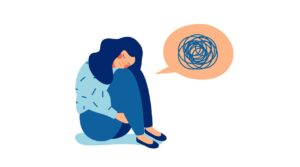Social anxiety can be a debilitating condition, preventing people from leading full and happy lives. If you are one of the millions of people who suffer from social anxiety, you may have considered using EMDR therapy to help you overcome your fears. EMDR therapy is a relatively new treatment that has been shown to be very effective in treating social anxiety. In this comprehensive guide, we will discuss what EMDR therapy is, how it works, and whether or not it is right for you.
Contents
- 1 What Is EMDR?
- 2 Can EMDR Reduce Anxiety?
- 3 How Does EMDR For Social Anxiety Work?
- 4 How Many EMDR Sessions Are Needed For Anxiety?
- 5 What Benefits You Can Expect With EMDR For Social Anxiety?
- 6 When Is EMDR Not Recommended?
- 7 How Long Does It Take For EMDR To Work For Social Anxiety?
- 8 How To Find EMDR Therapists For Social Anxiety Near Me?
- 9 Conclusion
What Is EMDR?
 Eye Movement Desensitization and Reprocessing (EMDR) is a form of psychotherapy that helps people overcome traumatic experiences. The main focus of EMDR is to help clients process and resolve difficult memories, thoughts, and feelings related to traumatic events in their lives. It combines elements of cognitive behavioral therapy with eye movements or other forms of rhythmic, bilateral stimulation.
Eye Movement Desensitization and Reprocessing (EMDR) is a form of psychotherapy that helps people overcome traumatic experiences. The main focus of EMDR is to help clients process and resolve difficult memories, thoughts, and feelings related to traumatic events in their lives. It combines elements of cognitive behavioral therapy with eye movements or other forms of rhythmic, bilateral stimulation.
These eye movements are thought to help the brain reprocess difficult experiences, leading to improved mental health and well-being. EMDR is used to treat a variety of psychological issues including post-traumatic stress disorder (PTSD), anxiety, panic attacks, etc.
If you feel that you may benefit from EMDR, it is important to find a qualified therapist who can help guide you through the process. It is also important to discuss any concerns or questions with your therapist before beginning treatment. EMDR therapy can offer many benefits and can have a lasting impact on one’s overall psychological health and well-being.
Can EMDR Reduce Anxiety?
Many studies have found that EMDR can be effective in reducing symptoms of anxiety. Whether it is a general anxiety disorder or specific anxiety such as a social phobia. In one study, 78% of participants showed significant reductions in their anxiety levels following EMDR therapy.
Additionally, there were also improvements in the participant’s ability to cope with stressful situations. And they reported an increased sense of control over their anxiety.
These results suggest that EMDR can be a powerful tool for managing and reducing symptoms of anxiety. It has the potential to help people confront and overcome the fears that are preventing them from leading healthy, fulfilling lives.
How Does EMDR For Social Anxiety Work?
 If you are suffering from social anxiety, you may have considered trying Eye Movement Desensitization and Reprocessing (EMDR) therapy. EMDR is a type of psychotherapy that was specifically designed to help with traumatic memories and the resulting symptoms of PTSD. It can also be used to reduce symptoms associated with social anxiety.
If you are suffering from social anxiety, you may have considered trying Eye Movement Desensitization and Reprocessing (EMDR) therapy. EMDR is a type of psychotherapy that was specifically designed to help with traumatic memories and the resulting symptoms of PTSD. It can also be used to reduce symptoms associated with social anxiety.
When using EMDR for social anxiety, the therapist will use a series of eye movements or other forms of bilateral stimulation. Such as sounds or taps to direct your focus from one memory to another. The purpose is to help you process and reframe traumatic memories so that they no longer cause distress.
The therapist will also ask you to identify a positive belief or thought that can replace the negative one associated with your anxiety. This new belief will help you gain control over your social anxiety and allow you to focus on more positive experiences in the future.
Overall, EMDR therapy for social anxiety is a safe and effective way to reduce symptoms. It can help you find new ways to cope with your anxiety and create more positive experiences for yourself. It can also make it easier for you to interact in social situations with less fear or apprehension.
How Many EMDR Sessions Are Needed For Anxiety?
The number of EMDR sessions needed for anxiety will vary from person to person. Some individuals may experience significant relief with just a few sessions while others may require more in order to fully benefit from the therapy. In general, it can take anywhere from 5-10 sessions total to address an individual’s anxiety issues.
The exact number of sessions necessary will depend on the severity of the anxiety, the frequency, and intensity of symptoms, and how quickly progress is made in therapy. It’s important to work with a qualified EMDR therapist who can assess your individual needs and provide an estimate of how many sessions may be necessary.
Additionally, it’s important to remember that EMDR is not just about treating current symptoms. But also about addressing the underlying causes of anxiety so that individuals can gain long-term relief from their symptoms. As such, more sessions may be required to ensure individuals work through all of the necessary components for successful outcomes.
What Benefits You Can Expect With EMDR For Social Anxiety?
 The following are numerous benefits you can expect from EMDR for social anxiety:
The following are numerous benefits you can expect from EMDR for social anxiety:
1. Reduced symptoms of social anxiety – By targeting and working through anxious thoughts, feelings, and memories associated with a particular situation or person, EMDR allows individuals to process their reactions in a healthy way and reduce symptoms of social anxiety.
2. Improved self-confidence – EMDR encourages individuals to view themselves differently. So they can learn how to cope with their anxious thoughts and feelings in social situations. This helps build self-confidence, reducing the fear of judgment or criticism from others.
3. Increased comfort level in public – By providing tools and techniques for managing anxiety while interacting with others, EMDR helps individuals become more comfortable in situations where they might previously have felt anxious or overwhelmed.
4. Improved relationships – As individuals learn how to manage their anxiety, it will help them develop better relationships with others. And feel more connected to the people around them.
5. Greater ability to handle stressful situations – By focusing on the sources of social anxiety, EMDR helps individuals to build the skills necessary to handle stressful situations without becoming overwhelmed. This can lead to improved social functioning and better communication with others.
6. Reduced fear of judgment or criticism – As individuals learn how to cope with their anxious thoughts and feelings better, they will eventually develop a greater sense of self-conviction which can help to reduce their fear of judgment or criticism from others.
7. Improved overall well-being – As individuals learn how to manage their anxiety, it can lead to improved overall mental health and well-being. This can bring about positive changes in areas such as mood, sleep, focus, and energy levels.
Overall, it is a safe and effective form of treatment that has been proven to be beneficial for many people dealing with social anxiety. So, be sure to talk to your doctor or mental health specialist if you are considering using EMDR for social anxiety.
When Is EMDR Not Recommended?
Though EMDR for social anxiety is a popular and effective form of therapy, it is not recommended for everyone. Here are a few scenarios where EMDR is not the best choice:
- If a person has a history of serious mental health issues such as bipolar disorder or schizophrenia. Then, they may need other types of therapy to address their symptoms.
- If someone’s anxiety is so severe that it interferes with their daily functioning, they may require more intensive treatment.
- People who are unable to recall past memories, or have difficulty revisiting trauma may not benefit from this type of therapy.
- If a person has difficulty focusing or is easily distracted, EMDR might not be suitable for them. As it requires concentration and focuses in order to be successful.
Finally, while EMDR is a powerful tool that can help many people, it’s important to remember that not everyone will respond in the same way. It may take some trial and error to find a therapy that works best for you. So, it’s important to be open-minded and willing to try different treatments if necessary.
How Long Does It Take For EMDR To Work For Social Anxiety?
It depends on the individual, as well as the severity of the social anxiety. Generally, research indicates that EMDR can have positive outcomes after a few sessions, with more lasting results over time. Because everyone’s experience of social anxiety is unique, it’s difficult to give an exact timeline for when one could expect to see results from EMDR.
It is important to remember that EMDR is not a quick fix. But rather a powerful tool to help manage the symptoms of social anxiety. It can take time and patience, as well as working with an experienced therapist to achieve lasting results. However, for many people with social anxiety, EMDR can be a life-changing treatment option.
How To Find EMDR Therapists For Social Anxiety Near Me?
 Well, finding an EMDR therapist for social anxiety near you can be a challenge. Fortunately, there are a few ways to go about finding one. Some of these tips are:
Well, finding an EMDR therapist for social anxiety near you can be a challenge. Fortunately, there are a few ways to go about finding one. Some of these tips are:
- Ask your primary care physician for a referral.
- Look for local EMDR groups and support groups in your area.
- Contact a mental health organization or association to inquire about their members who specialize in EMDR therapy.
- Search for therapists who specialize in treating social anxiety with EMDR on online directories such as MantraCare.
- Check if your insurance covers EMDR therapy.
By following these steps, you should be able to easily find an EMDR therapist near you who can help manage your social anxiety. Make sure to ask any questions you may have during your initial consultation and to ask for references from any therapists you are considering. With the right therapist, you can begin the journey toward managing your anxiety and reclaiming your life.
Conclusion
To conclude, EMDR for social anxiety is a promising therapy for those affected by this debilitating disorder. It can help to reduce the symptoms of social anxiety, such as fear and avoidance. While also helping to build skills to manage it in the future. Although EMDR is not a panacea and other therapies may be needed according to individual needs.
If you are interested in trying EMDR for your social anxiety, it is important to find a qualified and experienced therapist who can help you through the process. With the right support, EMDR can make a difference in how you feel and how you cope with social situations.
For more information, please contact MantraCare. Anxiety is a feeling of fear, worry, and unease often related to an upcoming event or uncertain outcome. If you have any queries regarding Online Anxiety Counseling experienced therapists at MantraCare can help: Book a trial Anxiety therapy session


